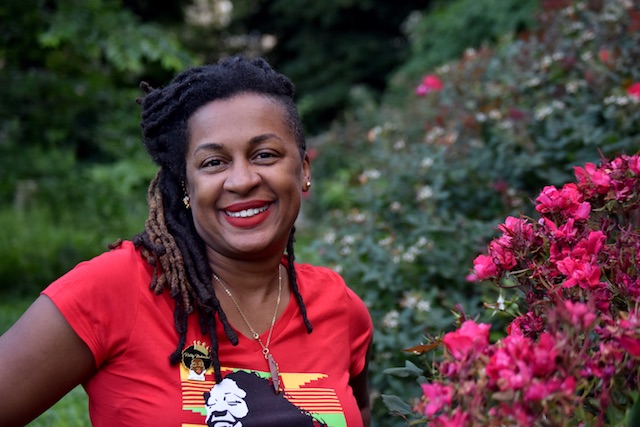Janvieve Williams Comrie is a multi-talented marvel. I met her nearly 20 years ago through her work as a human rights strategist and organizer. Included in her body of work is the creation of a healing food doula service and the founding of her own facilitation consulting firm. She also serves as an associate professor at The New School. In 2018, Janvieve she was awarded a prestigious two-year Soros Fellowship to create AfroLatina Journey to Racial Justice, a national network of Afro-Latina organizers. But I most admire how she infuses her vital political analysis into raising her beautiful children. Here’s who Janvieve Williams Comrie thinks she is.
Who are you?
I’m a Black migrant woman from Panama. I live in The Bronx. Nine years ago, before I had my first child, that would’ve been it. But I feel like being a mother has shaped so much for me. My whole life revolves around motherhood and questioning my role in this social justice movement and being intentional around what kind of legacy are we creating for the next, next, next generation. I am constantly thinking about how I will be impactful for the next 20 or 30 years. Questioning identity is also at the forefront because I have now lived most of my life outside of my country.
How do you identify racially?
I’m a Black woman. There’s no confusion. You look at me and you know I’m Black. Ethnically, I’m from Latin America, but that’s different.
Have you ever filled out the Census? And if you have, how did you answer the question?
I filled that out with my partner 10 years ago, but I didn’t fill it out for myself. I have this thing with forms, especially that have to go to the government because of my immigration story. Even though it’s in the past, it’s still part of who I am. But I’m very familiar with it because I’m using it as a training tool.
When I do anti-oppression trainings, I always bring in the Census piece, even though the word “Hispanic” is there. I dislike and won’t ever identify as Hispanic [myself.] But it’s a way to keep Latino folks clear that their country is not their race.
I’m automatically a Black woman despite where I am from, but I am not automatically a Latina woman, even among Latino folks. One of the big things is that even folks that look White claim to be of color. That, in my analysis, is anti-Black because you’re placing yourself as a person that faces specific racialized oppression when you actually experience privilege within these groups. By not acknowledging that privilege, you are practicing the racism that we are trying to combat.
Are there other times or places that you’ve answered the question of “What is your race” differently?
No. It’s consistent when I travel and in any language. It would be ridiculous to answer anything else.
How will you answer the question on the 2020 Census?
I’ll answer it because now I’m a mother of two children. I won’t answer it if they’re going to be tracking folks based on citizenship or residency. But I have children born and raised here, and they have a strong Bronx identity, a strong Black identity and definitely have a strong Panamanian identity.
What is your definition of Latino/Latina/Latinx?
First of all, I don’t think folks in the region—and I go back often—are thinking about, “What is Latinidad?” I’ve never been identified as a Latina outside of this country. Part of the intro of the book I’m writing is defining what Latinidad is in the context of borders, culture, politics, economics and who belongs and who doesn’t.
For me, in the last 10 years, I think there’s been more of an understanding of me being from Panama and not the question of, “Oh, you speak Spanish?” It seems that there’s more people in the media, [more] attention, and [more] work around representation of Black people from Latin America in the United States. And yet visibility is not brand new. You have people like Marta Moreno Vega in New York and [the late] Esmeralda Brown. They are not always recognized for their work by some folks that wake up and realize that they’re Black.
How do you think the multiple—and maybe contested—definitions of Latino, Latina and Latinx impact efforts toward racial justice?
By claiming Latinidad as a race, who’s going to be left out? Black and Indigenous people.
By including Latino as a race, it’s just going [to] privilege all those that are privileged right now—White Latinos. The status quo for most Latino organizations that do immigrant rights for people from Latin America [will] continue being White.
What is the particular impact of Latinx racial identity on your work?
My work now is focused on recognizing that our history doesn’t start when we came to or were born in this country. Our history starts from being racialized in our home countries and for being terrorized in our home countries because of the United States and its understanding around race.
I am writing about Black women from Latin America. I’m not trying to carve out spaces within Latino groups. Wherever there are Black people, I feel that we need to be a united front. The solutions for my community have to arise from my community with a racial justice lens to resolve those issues.
Rosana Cruz is a writer, parent, social justice movement leader and intersectional feminist. They have lived in New Orleans for over 20 years and in that time, worked closely with numerous organizations in the struggle for racial justice, LGBTQIA+ liberation and immigrant rights. They currently serve as a senior fellow at Race Forward, the national racial justice organization that publishes Colorlines. Essays by Cruz have been published in hipMama, Bridge the Gulf Project, Colorlines and the anthology Mamaphonic. Cruz is a 2017 VONA Voices Fellow. Short fiction by Cruz is forthcoming in the Spring 2020 issue of Black Warrior Review.
